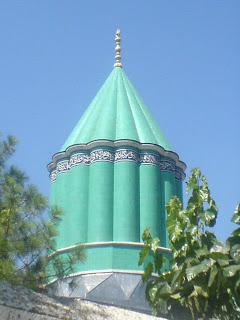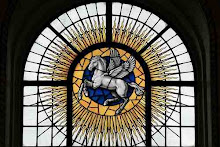
DERVISH
Put off
The black garment
Let the soul
Shine forth
Breathing
Like a rose
Expanding
Whiteness
Spreading
Beyond these walls
To landscapes
Rolling
Echoing sky
The mind
Wanders
To corners
Of universe
Unexplored
Music leads
The eternal spiral
White soul
Shines
Like the glowing
Sun
The dancers
Revolve
In ecstatic silence
Listeners
Move
In hypnotic trance
The dervish
Speaks
Observes
The ritual
Divine expression
Of the heavenly dance
Last year I found myself in Konya in Turkey, home of the great Sufi Mystic and Poet, Rumi, who founded the famous Mevlevi Order, or Whirling Dervishes. I say 'found myself'. Well, this was literally true. As keeps happening to me with other interesting places, Konya found me. I had chosen a 'random holiday' in Turkey and had arrived in Side on the Anatolian Coast. While I was there I discovered, to my astonishment, that Konya was only a few hours' bus ride from where I was. Well, naturally I had to go. I wasn't sure when I was next going to be in the neighbourhood. And when do you get to visit the home of one of the greatest Mystics in the West?
This was easier said than done. Although there were loads of tours laid on for places such as Antalya, Cappadocia and, strangely, a great many open and covered markets (odd that), for some reason no-one thinks that Konya is worth visiting, in spite of its rich mystical past. For not only did Rumi live there, but the other great Sufi genius Ibn Arabi spent time there, writing poetry, falling in love and getting married (again). It is said that when Arabi saw the young Rumi walking behind is father, another great Sufi Sheikh, he remarked 'There goes an ocean behind a sea'...
Happily, some of the staff of the little hotel I was staying at, hearing I was interested in Konya, went out of their way to help me get there, arranging a ticket and showing me where to get the bus. Great guys. Thank you Ali, Mehmet et al!
Konya is an extraordinary place. After four hours journey through the seemingly endless Taurus Mountains, it suddenly emerges over a ridge like some enormous shangri-la or hidden city. Stretched out before me were more Mosques than I had ever seen. I shouldn't have been suprised. Konya is one of Turkey's most Islamic cities. But this was no centre of extremism. the energy was terrific. The people were extraordinarily friendly, volunteering to help with language difficulties, warm and enthusiastic about showing me around. And the women, although more often than not wearing headscarves, were beautiful and flamboyant. I don't remember seeing any 'all-in-one' burkhas with narrow slits for the eyes anywhere. Although religious, Konya seemed very much alive with the women as involved with what was going on as the men.

Rumi's Lodge is one of the most famous sites of Pilgrimage in the Islamic world after the obvious ones in Saudi Arabia. Although Sufism is still not officially allowed in Turkey after the decrees of the great secular leader Kemal Ataturk, such is the popularity and reverence for the great Poet that the Lodge has been kept as a museum. Situated right next to one of the oldest Mosques in Turkey, it draws visitors from all over the world - and not only Muslims. As the inscription reads in the hall, all are welcome:
"Come, come, whoever you are,
Wanderer, idolater, worshiper of fire,
Come even though you have broken your vows a thousand times,
Come, and come yet again.
Ours is not a caravan of despair."
Inside are the tombs of the most famous of the Mevlevi Sheiks, their hats perched on top of each, an enormous water bowl for pilgrims, an original copy of the Mathnawi, Rumi's poetic Magnum Opus, regarded in some quarters as 'the Second Koran' and the rooms in which the Mevlevi Sufis practised their famous Dance.

Still banned in Turkey except under certain heritage/ entertainment contexts, the symbolism of the Dance is beautiful. The Mevlevi appear wearing their famous tall hats dressed in long, black cloaks. As the music begins, they form a circle around their Sheikh who keeps time for the dance. As the Mevlevi dance, they remove their cloaks, revealing the pure white robes underneath, symbolising the liberation of the Soul from the Body. They whirl round the Sheikh in a circle, symbolising the planets revolving around God. One arm is held up, the hand receiving the Divine Baraka (Blessing) from God, the other faces down and out, dispensing that Baraka to all created things. As they dance, the Mevlevi undergo an ecstatic trance state in which they experience transcendence, oneness with God, perhaps, even, an out of body experience (it is not hard to believe. The geometric patterns all over the walls, floors, domes and furniture of the Lodge seem designed to induce a meditative state. Everything is a Mandala). At the end of the dance, the Mevlevi slow down to a stop, put their cloaks back on, symbolising the return to the Body, and leave.

The music of the dance is also a key element of the Mevlevi practise. Each Novice is given their own reed flute, known as a Ney, by their Master, which has been specially made to be their own personal instrument. Very precious, the imagery of the reed flute echoes the introduction to the Mathnawi in which Rumi compares the plaintive cry of the reed to be returned to the riverbank to the yearnings of the Soul to be returned to God. Each member of the Mevlevi Order learns how to play his Ney, the sound of which is deeply resonant and moving. All Ney music is improvised and thus personal to the individual Novice.
Rumi is beloved all over the world, not just in Islamic countries. In America, thanks to the translations of Coleman Barks (which, alas, I wouldn't recommend), he is ranked as one of the most popular poets among the population. But Rumi is not uncontroversial. Among many hardline Muslims he is a heretic (dancing and music are, strictly speaking, haram in Sharia Law, as is drinking wine), while other, less severe Muslims tend to get frustrated by the 'de-Islamification' of Rumi by Western enthusiasts. Indeed, the reason why I wouldn't recommend Bark's translation is that they remove all reference to Rumi's Islam, presenting him as a rather indulgent, garrulous, easy-going old hippie who liked a good puff on his hookah and wouldn't have been out of place in 60s California. Rumi was a genius, and one who went far beyond the limits of his own religion, seeing Divine Love in everyone, but he WAS a Muslim and it would be misleading to represent him as otherwise. Happily, he didn't see any contradiction between this and loving his fellow men regardless of race, religion or culture. A kind of Islamic Rabbi Kook, only about seven hundred years earlier!

Leaving Konya, I felt transformed. Here was an encounter with a genuine Mystic and Seer, one who, while steeped in his own tradition, reached out to embrace everyone. The welcome I got in Konya was ecstatic. As an advert for a tolerant, warm, life-giving Islam, it was a far cry from the images we get of Saudi Arabia, the Taliban or even the more extreme spokespeople in our country. Konya proved that there was no contradiction between Islam and freedom. When I returned to my hotel, the staff who had helped me asked how I got on, with definite pride in their faces (it was a feature of Side that EVERYONE knew who I was referring to when I mentioned Rumi, compare to the UK - how many of us would know who William Tyndale or Julian of Norwich were?) I told them I had been greeted with incredible warmth and openness. They smiled and said 'It is because although you are not a Muslim you are interested in our culture. You made an effort.' A simple thought, but it made sense.

So. Konya. Rumi. If you can make the journey, I recommend it. A once in a lifetime experience. Rather cheekily, I would like to leave you with a poem inspired by my time there and the Man himself. This is a companion piece to the poem above:
DANCER
The dancer
Turns
Eternal
Under
The coloured dome
Of music
Outside
Pilgrims gather
At the fountain
The watcher
In the alcove
Presides
Beneath
The turquoise tower
Greetings abound
Lyrics
Hang in the air
Wishing
Calm for
Travellers
Come
For peace
The reed flute
Longs
For returning
Each of us
Plays
At the river
Waiting
For the day
Of the wedding
When Beloved
And Lover
Are one


No comments:
Post a Comment